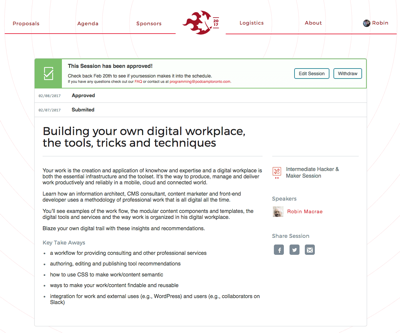Digital workplace presentation at PodCamp 2017-02-25

The slides presented at the Building your own digital workplace, the tools, tricks and techniques session (see below) at the PodCamp Toronto 2017 conference are available in a downloadable PDF version:
Digital workplace presentation PodCamp 2017-02-25 PDF v1c F
 as well as in this post, below. The links work in both the post version and the PDF. Note that the links to pages on my own local filesystem don’t work. They are identifiable by the absence of “http://” and a domain name.
as well as in this post, below. The links work in both the post version and the PDF. Note that the links to pages on my own local filesystem don’t work. They are identifiable by the absence of “http://” and a domain name.
I recently presented at the combined WPToronto East: Let’s talk SEO | The Toronto WordPress Group Meetup and Hands-On Workshop | The Toronto WordPress Group Meetup events are available in a downloadable PDF version in another post, Structured data SEO presentation at WPTO Meetup 2017-02-18.
See also Data Markup Strategy for SEO notes, 2016-11-23 | WordPress Toronto Meetup, my earlier post with extensive structured data research notes including articles and posts explaining key concepts and techniques in greater detail.
If you found my presentation useful, a tweet to that effect would be appreciated (@Robin_Macrae #SEO #structured data #WPTO).
The presentation video
The presentation slides
Building your own digital workplace, the tools, tricks and techniques
- The context
-
Download this presentation’s slides from bit.ly/pcto-17-dw (Digital workplace presentation at PodCamp 2017-02-25).
- What is a digital workplace?
- digital work inputs and outputs: all digital all the time
- knowledge work
- interconnected
- anytime, anywhere, any device
- Why a digital workplace?
What does a digital workplace address? Why do we care?
- creating content everywhere
- data ownership, portability, durability
- digital life privacy and legacy
- text, HTML, image, video, audio media types/formats
- Who am I and what do I do
- consultant
- information architect
- content guy (strategy, development, writing, editing)
- front-end developer (HTML, CSS)
- DW evangelist
- What I have been doing
- small business management consultant
- legal practitioner
- marketing communications
- software development, CMS
- tech consulting (strategy, management)
- This means professional services
- work methodology is my responsibility
- knowhow and expertise work product
- documentation (process, deliverables)
- accountability
-
- My DW infrastructure
- Core concepts
- hypertext (HTML)
- everything is a vast collection of web site
- real-time timekeeping (docketing)
- workflow
- Concepts applied
- every activity and output is supported
- self-documentation is documenting my process in real-time
- author a serial/chron flow of hypertext
- Everything I produce and consume is validated HTML
- ultimate in portability and longevity
- separation of form and content
- machine/human compatibility
- can copy and paste into email, MS Office, inline forms/editors
- Why hypertext
- language of the web
- better paradigm for knowledge work and iterative/agile work methodologies (real world is iterative, granular, discoverable)
- semantic capabilities (human readable, machine-to-machine)
- lower risk of tech obsolescence
- open source (last but not least)
- Tools
- WYSIWYG word processor (HoTMetaL)
- clipboard manager and search-and-replace utility
- browser tabs groups, auto-refresh
- hierarchical filesystem, Cruella (NTFS) (same on all devices)
- publishing (WordPress, SharePoint)
- The topic set
- folder(s) in a hierarchy, think of nested dolls
- standard organization of sub-folders within a site
- standard pages (files) using templates
- standard entries (more templates)
- The content structure hierarchy
- item
- sub-entry
- entry
- page
- topic set
- topic superset
- / (root)
- Collections and how to decide to create one
- each is a collection of the smaller unit of content
- an entry is a collection of items
- a page is a collection of entries
- a topic set is a collection of pages
- a topic superset is a collection of topic sets
- Why it works to produce flow
- always a place within a structure to put something
- findable by asking where should it be?
- any given thing can move up or down the content hierarchy (flexibility)
- automagic secure distribution, sharing and backup
- linking a no-brainer
- Linking is a no-brainer and effortless
- every unit of content is linkable
- create with page or entry and hidden
- each hidden set preset for entry, page and log
- often a cross-reference (bilateral in effect)
- TOC represents the topic set
- An intuitive and mnemonic approach
- think “where should that be” rather than where did I put it
- 4-tier hierarchy is sufficient
- inventory/schema of content items, sub-entries, entries, tmp entries, topic set, topic superset
- use keywords to navigate your own space (instant Spotlight indexing)
- Real-time docketing
- the essential interconnecting technique
- an essential aspect of an information unit and its findability
- self-instrumentation and measurement (accountability, reporting)
- transparency
- The metadata
- Tables of content in each topic set
- Indexes for high value or complex ones
- Chron for time-based lists, topic set numbering
- Infrastructure level aggregation
- Let’s see them
- HoTMetaL editor UI
- ClipMate and X-Replace utilities
- Firefox browser
- tech topic set (t58), folders, template, page, entry
- Core concepts
- Tour of the work landscape
- Addresses key issues
- granularity of content (what is the unit of content)
- fear of shipping (getting started)
- just-in-time vs just-in-case conundrum
- re-use
- Workflow screenshots
- desktop
- desktop space (OS X)
- Workflow example
- start in log entry
- move into a log entry sub-entry
- move into existing or new entry
- How I manage social media
- This event’s topic set
- PodCamp 2017 presentation (b326)
- this is what I use for this event
- lots of other event topic sets
- pages for previous PodCamp attendance and speaking (standardization)
- tour the page’s entries
- Project redesign WordPress site
- Dockets (timekeeping)
- 2016-02-22 We, the current docket
- Real-Time Log (2009 all), the last full year of the RTL compared to the current scheme
- compare to a client project log, Log 2016-05 | Metadata | NewPath | 2016-05-02 |
- A client topic set
- NewPath GKS, a client project
- a project, Scholarship application app 2016 | GKS Fund
- compare to another 6 years ago, SMRBA 2010 | hor01_p144 | 2010-11-02 |
- Log 2016-05 | Metadata | NewPath | 2016-05-02 |
- The WordPress guide topic superset
- The metadata infrastructure
- Re-use example
- evaluate a theme recommended for a WordPress client in a log entry
- move to a log sub-entry when length warrants
- move to a theme evaluation specific entry
- move to a redesign site page when theme selected for trial
- move to a CMS topic set when theme used for another client
- Addresses key issues
- Odds and ends
- Key tools
- HoTMetaL editor
- Firefox
- ClipMate clipboard manager utility
- X-Replace search and replace
- S5 HTML presentation script
- HoTMetaL still the best editor
- WYSIWYG word processor (editor)
- stylesheets applied
- essential tag information
- validated HTML (HTML 4.01 Strict)
- 16bit antique runs in Windows 7 VM
- WYSIWYG word processor (editor)
- Firefox addons
- Tab Groups (includes backup/restore; entry)
- Auto Reload (auto-refresh; entry)
- AutoCopy 2 (page)
- View Selection Source (context menu)
- ClipMate clipboard manager utility
- unlimited clips
- copy multiple times
- auto paste a series
- example of how little developers/vendors know about work
- X-Replace search and replace
- enables a template to be turned into a page
- think form with fields and values
- retain as record of set-up
- regex capable
- S5 HTML presentation script
- one of many open source available
- use HTML just like any other page
- has the key presentation capabilities without bloat, proprietary format, etc.
- The essential role of CSS
- functional (re-usable) and semantic (human readable, machine-to-machine)
- 500+ rules for entities, events, components, etc. (CSS selector sidebar menu (m8 1a))
- topic set specific vs topic superset vs Cruella
- makes a WYSIWYG editor essential (feedback)
- Cloud storage services
- SugarSync for sync and backup of user space (~36 GB) (replicates Cruella filesystem)
- Google Drive for casual sharing, SW archive
- OneDrive for project sharing, MS Office, SharePoint
- iCloud for OS X and iOS backup and sharing mail, contacts, photos
- Dropbox for personal and casual sharing and portability
- Acronis True Image for VM backup
- Cloud services
- Slack for collaboration
- Zoom for conferencing, screen sharing
- Skype for voice and video calls
- CMS use and opportunities
- WordPress for publishing (WP, TypeMetal clients; authoring UX overhaul)
- SharePoint (greatly improved authoring UX)
- static site generators (e.g., Jekyll)
- file-based CMSes (e.g., Kirby, a file-based CMS running on PHP, Apache and MySQL (same as WordPress))
- WordPress as a platform for an individual’s digital workplace
- use WordPress site as a way to integrate core capabilities
- Knowledge worker or solopreneur
- Subdomain sites planning | WB v2 site redesign management, Procedures (t153b_b2)
- 4 potential sites to add to WordPress as subdomains
- The platform
- Related concepts and further reading
- knowledge management
- Working out loud
- an organization’s intranet
- eating your own dogfood
- Previous digital workplace related presentations
- Developing an Enterprise Strategy to Deliver Customized Sets of Capabilities is my 2008 deck for an SharePoint Saturday conference event presentation (event_b80_TSPUG_pres_2008-02-20)
- Shifting WordPress from Manual to Automattic is my 2016 deck co-authored with Sirota
- Key tools
- Questions